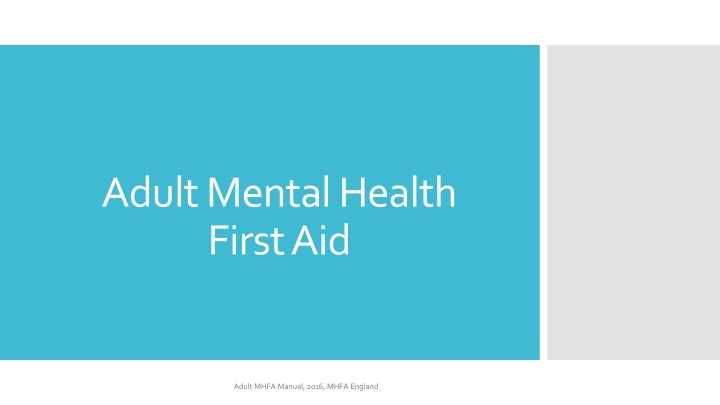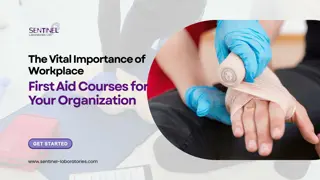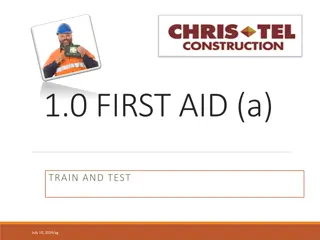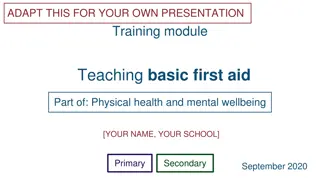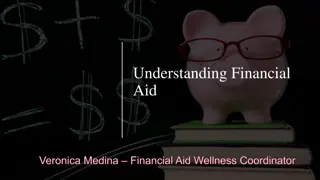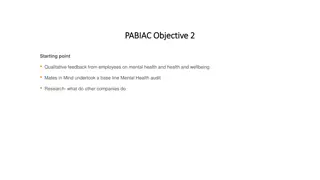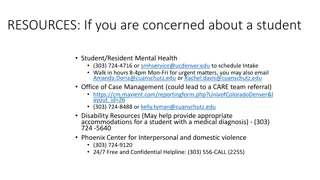Importance of Mental Health First Aid Training in the UK
The UK Government initiated a campaign in 2017 to train one million people in basic mental health first aid skills, aiming to provide support in schools, workplaces, and communities. MHFA England offers accredited training to improve the nation's mental health. The presentation provides an overview of Mental Health First Aid training by MHFA England, outlining the two-day course for staff members interested in becoming Mental Health First Aiders. Additionally, the Catholic Children's Society offers various support programs for schools promoting positive mental health, including services for children dealing with loss.
Download Presentation

Please find below an Image/Link to download the presentation.
The content on the website is provided AS IS for your information and personal use only. It may not be sold, licensed, or shared on other websites without obtaining consent from the author.If you encounter any issues during the download, it is possible that the publisher has removed the file from their server.
You are allowed to download the files provided on this website for personal or commercial use, subject to the condition that they are used lawfully. All files are the property of their respective owners.
The content on the website is provided AS IS for your information and personal use only. It may not be sold, licensed, or shared on other websites without obtaining consent from the author.
E N D
Presentation Transcript
Adult Mental Health First Aid Adult MHFA Manual, 2016, MHFA England
Why Mental Health First Aid? In 2017 the UK Government launched a campaign to train one million people in basic mental health first aid skills to aid mental health support in schools, workplaces and communities across the UK. In a press release the Prime Minister Theresa May stated: I want us to employ the power of government as a force for good to transform the way we deal with mental health problems right across society, and at every stage of life. Mental Health First Aid :- A Rationale This starts with ensuring that children and young people get the help and support they need and deserve because we know that mental illness too often starts in childhood and that when left untreated, can blight lives, and become entrenched https://www.gov.uk/government/news/prime-minister-unveils- plans-to-transform-mental-health-support MHFA England is the UK accredited provider of Mental Health First Aid Training, with the aim to improve the mental health of the nation. https://mhfaengland.org/ Adult MHFA Manual, 2016, MHFA England
The PowerPoint presents a brief overview of the training for Mental Health First Aid as provided by MHFA England. It outlines the areas covered in the two-day training course for members of staff who wish to become Mental Health First Aiders. The PowerPoint, however, is not in itself intended as a training tool. Purpose of the presentation Adult MHFA Manual, 2016, MHFA England
The Catholic Childrens Society provide a wide range of support for schools in promoting positive mental health including support for children experiencing loss. Catholic Children s Society Mental Health Training ConnectEd Mental Health Services https://www.cathchild.org.uk/school-counselling-and-therapy/ https://www.cathchild.org.uk/connected/mental-health-training/ https://www.cathchild.org.uk/mental-health-first-aid/ Rainbows Bereavement Support Programme https://www.cathchild.org.uk/rainbows-bereavment-support- programme/ Adult MHFA Manual, 2016, MHFA England
Adult Mental Health First Aid Manual by MHFA England A brief summary of content Adult MHFA Manual, 2016, MHFA England
Section 2 Section 1 Suicide Mental Health First Aid Adult Mental Health First Aid Manual Substance Abuse About Mental Health Useful Statistics Depression Useful Statistics Adult MHFA Manual, 2016, MHFA England
Section 4 Section 3 Psychosis Anxiety Disorders Adult Mental Health First Aid Manual Building a mentally healthy community Self Harm Eating Disorders Useful Statistics Personality Disorders Useful Statistics Adult MHFA Manual, 2016, MHFA England
Appendices Appendix A Cognitive Behavioural Therapy (CBT) Appendix B Nutrition and Mental Health Adult Mental Health First Aid Manual Appendix C WRAP Helpful Resources References Adult MHFA Manual, 2016, MHFA England
Mental Health First Aid About Mental Health Depression Useful Statistics Section 1 Adult MHFA Manual, 2016, MHFA England
Its aims are to: The course teaches people: 1. Preserve life where a person may be at risk of harm to themselves or others. How to spot early signs of mental health issues, including warning signs of common mental health crises How to offer and provide initial help How to guide a person towards appropriate treatment and other sources of supportive help. Section 1: Mental Health First Aid What is Mental Health First Aid? 2. Provide help to prevent the mental health issue from becoming more serious. 3. Promote recovery of good mental health. 4. Provide comfort to a person with a mental health issue. 5. Raise awareness of mental health issues in the community It does not teach people to provide a diagnosis or therapy 6. Reduce stigma and discrimination Adult MHFA Manual, 2016, MHFA England
Mental health issues are common Section 1: Mental Health First Aid Why Mental Health First Aid? There is stigma associated with mental ill health Many people are not well informed Many people with mental health issues don t get adequate treatment or they delay accessing treatment People may lack the insight to realise that they need help or that help is available Members of the general public often don t know how to respond Mental Health First Aid has been found to be effective Adult MHFA Manual, 2016, MHFA England
The five basis steps: ALGEE 1. Approach the person, assess and assist with any crisis Section 1: Mental Health First Aid Action Plan 2. Listen and communicate non-judgementally 3. Give support and information 4. Encourage the person to get appropriate professional help 5. Encourage other supports Adult MHFA Manual, 2016, MHFA England
It is important to care for yourself when offering help Section 1: Mental Health First Aid Action Plan - Things to bare in mind Providing Mental Health First Aid to someone from a different cultural background Being culturally competent when providing Mental Health First Aid Practising cultural safety Adult MHFA Manual, 2016, MHFA England
What is mental health? What is mental ill health? How common are mental illnesses? Section 1: About Mental health The impact of mental health issues Spectrum of interventions for mental ill health Prevention Early intervention Treatment and support Professionals who can help Recovery Adult MHFA Manual, 2016, MHFA England
Mental Health and Age Section 1: Stigma and Discrimination Strands of inequality Mental Health and Gender Mental Health and Disability Mental Health, Race and Ethnicity Mental Health and Religion and Belief Mental Health and Sexuality The mental health continuum Adult MHFA Manual, 2016, MHFA England
Stress and vulnerability models Sources of stress The Stress Vulnerability Model The Stress Container Section 1: What influences mental health? Protective and risk factors Protective factors Risk factors Nature vs nurture The Frame of Reference Adult MHFA Manual, 2016, MHFA England
Symptoms of depression Section 1: What is depression? Effects of depression Warning signs of depression Physical Appearance Attitudes and thinking Bipolar disorder - a particular type of depression Adult MHFA Manual, 2016, MHFA England
Examples of risk factors Section 1: Risk Factors for depression Those most prone to depression Perinatal Depression Adult MHFA Manual, 2016, MHFA England
The rationale for addressing mental health in the workplace Section 1: Depression in the workplace Supporting mental health in the workplace Possible signs and symptoms of depression in the workplace Adult MHFA Manual, 2016, MHFA England
Prevalence and impact of mental ill health global facts and figures Section 1: Useful Statistics Prevalence and impact of mental ill health UK facts and figures Mental health inequality, discrimination and stigma facts and figures Depression and mood disorders facts and figures. Adult MHFA Manual, 2016, MHFA England
Suicide First aid for suicidal crisis First aid for depression Section 2 Substance misuse Useful Statistics Adult MHFA Manual, 2016, MHFA England
About Suicide Myths and facts about suicide Section 2: About suicide First Aid for depression (Using the five basics steps ALGEE) Wellbeing Approaches Adult MHFA Manual, 2016, MHFA England
First aid for suicidal crisis The five basic steps Section 2: First aid for suicidal crisis (Using the five basics steps ALGEE Approach the person, assess and assist with any crisis Listen and communicate non-judgementally Give support and information Encourage the person to get appropriate professional help Encourage other supports Adult MHFA Manual, 2016, MHFA England
First aid for depression The five basic steps Section 2: First Aid for depression (Using the five basics steps ALGEE) Approach the person, assess and assist with any crisis Listen and communicate non-judgementally Give support and information Encourage the person to get appropriate professional help Encourage other supports Adult MHFA Manual, 2016, MHFA England
Connect Be Active Section 2: First aid for depression - The Five Ways to Wellbeing Take Notice Keep Learning Give For more information - https://neweconomics.org/2008/10/five-ways-to-wellbeing Adult MHFA Manual, 2016, MHFA England
Giving Do things for others Relating Connect with people Exercising Take care of your body Awareness Live life mindfully Trying Out Keep learning new things Direction Have goals to look forward to Resilience Find ways to bounce back Emotions Look for what is good Acceptance Ce comfortable with who you are Meaning Be part of something bigger Section 2: First aid for depression - The 10 Keys to Happier Living For more information - https://www.actionforhappiness.org/10-keys-to-happier-living Adult MHFA Manual, 2016, MHFA England
What is substance misuse? Symptoms of substance misuse Dependence syndrome Harmful Use Section 2: Substance Misuse Alcohol Short-term problems caused by alcohol intoxication Long-term problems caused by alcohol use Alcohol and medication for mental health issues Alcohol unit guide Drugs Adult MHFA Manual, 2016, MHFA England
Risk factors for alcohol misuse Availability and tolerance of alcohol in society Alcohol use in the family Social factors Genetic disposition Alcohol sensitivity Enjoyment of alcohol Changes in brain chemistry may also play a role Other mental health issues Risk factors for substance misuse Adult MHFA Manual, 2016, MHFA England
Section 2: First Aid for substance misuse The five basic steps: ALGEE First aid for substance misuse The five basic steps Approach the person, assess and assist with any crisis Listen and communicate non-judgementally Give support and information Encourage the person to get appropriate professional help Encourage other supports Adult MHFA Manual, 2016, MHFA England
Suicide UK facts and figures Suicide global facts and figures Treatments that work for depression facts and figures Section 2: Useful Statistics Alcohol, substance use and suicide facts and figures Alcohol, substance use and mental health (dual diagnosis)- facts and figures Alcohol use facts and figures Substance use facts and figures Treatment for alcohol and substance misuse facts and figures Adult MHFA Manual, 2016, MHFA England
Anxiety Disorders Self Harm Eating Disorders Section 3 Personality Disorders Useful Statistics Adult MHFA Manual, 2016, MHFA England
General symptoms of anxiety Physical effects Psychological effects Behavioural effects Section 3: What is an anxiety disorder? The Goldberg Anxiety Scale Types of anxiety disorders Generalised anxiety disorder (GAD) Panic disorder Phobias Acute stress disorder(ASD)/Post-traumatic stress disorder (PTSD) Obsessive compulsive disorder (OCD) Mixed anxiety and depression Adult MHFA Manual, 2016, MHFA England
Risk factors for anxiety disorders Examples are: Genetics Being a more sensitive, emotional person who tends to see the world as threatening A history of marked shyness in childhood or adolescence for social anxiety disorder Persistent stress or extreme stress Adverse experiences in childhood Poverty, poor education and social disadvantage Recent adverse and traumatic life events Having another mental health issue Section 3: Risk Factors for anxiety disorders Anxiety symptoms can also result from: Some medical conditions Side effects of certain prescription drugs Use and misuse of alcohol or certain non-prescribed drugs (including caffeine and nicotine) Withdrawal from alcohol or prescription and non-prescription drugs Adult MHFA Manual, 2016, MHFA England
Section 3: First aid for anxiety disorders The five basic steps (ALGEE) First aid for anxiety disorders The five basic steps Approach the person, assess and assist with any crisis Listen and communicate non-judgementally Give support and information Encourage the person to get appropriate professional help Encourage other supports Adult MHFA Manual, 2016, MHFA England
Section 3: Self-harm What is self- harm? What is self-harm? Why do people self-harm? Other expressions of distress risk taking behaviour Self-harm and stigma Adult MHFA Manual, 2016, MHFA England
Section 3: First aid for self-harm The five basic steps (ALGEE) First aid for self-harm The five basic steps Approach the person, assess and assist with any crisis Listen and communicate non-judgementally Give support and information Encourage the person to get appropriate professional help Encourage other supports Adult MHFA Manual, 2016, MHFA England
What are eating disorders? Section 3: Eating disorders What are eating disorders? What is anorexia nervosa? Symptoms of anorexia nervosa Physical health problems linked with anorexia nervosa What is bulimia nervosa? Symptoms of bulimia nervosa Physical health problems linked with bulimia nervosa What is binge eating disorder (BED)? Symptoms of binge eating disorder Physical health problems linked with binge eating disorder Adult MHFA Manual, 2016, MHFA England
Risk factors for eating disorders Conflict at home; abuse; neglect or strict upbringing with high expectations of children Family history of dieting/parental obesity Section 3: Risk factors for eating disorders Persistent critical comments from other about eating, weight or body shape (Societal Pressures also) Pressure to be slim because of occupation Dieting Obesity Early onset of menstruation Family history of eating disorders or other mental health issues Certain personality characteristics Adult MHFA Manual, 2016, MHFA England
Section 3: First aid for eating disorders The five basic steps (ALGEE) First aid for eating disorders The five basic steps Approach the person, assess and assist with any crisis Listen and communicate non-judgementally Give support and information Encourage the person to get appropriate professional help Encourage other supports Adult MHFA Manual, 2016, MHFA England
What is personality? What is personality disorder? Why is personality disorder important? When and why do personality disorders occur? Section 3: Personality Disorders Types of personality disorders Cluster A personality disorders odd cluster Cluster B personality disorders dramatic cluster Cluster C personality disorders anxious cluster How common are different types of personality disorders? Recover from personality disorder Personality disorder and Stigma Adult MHFA Manual, 2016, MHFA England
Anxiety disorders facts and figures Panic attacks background info on slow breathing guidance Section 3: Useful Statistics Self-harm facts and figures Eating disorders facts and figures Anorexia nervosa facts and figures Bulimia nervosa facts and figures Binge eating disorders facts and figures Personality disorders facts and figures Adult MHFA Manual, 2016, MHFA England
Psychosis Building a mentally healthy community Section 4 Useful Statistics Adult MHFA Manual, 2016, MHFA England
What is psychosis? General symptoms of developing psychosis Changes in emotion and motivation Changes in thinking and perception Changes in behaviour Taking account of different cultures Section 4: What is psychosis? Types of psychotic disorders Schizophrenia Bipolar disorder Psychotic depression Postpartum psychosis Schizoaffective disorder Drug-induced psychosis Psychosis and stigma Adult MHFA Manual, 2016, MHFA England
Genetic factors Changes in brain chemistry and neurotransmitters, especially dopamine Structural brain changes A difficult childhood (including traumatic experiences) Section 4: Risk factors for psychosis Complications at birth Stress, in particular social stressors City life, social adversity, ethnicity and migration General medical conditions Alcohol, cannabis and other drugs Other factors Adult MHFA Manual, 2016, MHFA England
First aid for psychosis The five basic steps Approach the person, assess and assist with any crisis Section 4: First aid for psychosis Listen and communicate non-judgementally Give support and information Encourage the person to get appropriate professional help Encourage other supports Adult MHFA Manual, 2016, MHFA England
Building a mentally healthy community Building a mentally healthy community Adult MHFA Manual, 2016, MHFA England
Psychosis facts and figures Psychosis, stigma and crime facts and figures Section 4: Useful Statistics Treatment for psychosis facts and figures Schizophrenia facts and figures Bipolar disorder facts and figures Adult MHFA Manual, 2016, MHFA England
Appendix A Cognitive behaviour therapy (CBT) Appendix B Nutrition and mental health Appendices Appendix C WRAP (Wellness Recovery Action Planning) Helpful Resources References Adult MHFA Manual, 2016, MHFA England
This course can be accessed through https://mhfaengland.org/individuals/ adult/ Two-day Training Course or via the Catholic Children s Society https://www.cathchild.org.uk/menta l-health-first-aid/ Adult MHFA Manual, 2016, MHFA England
